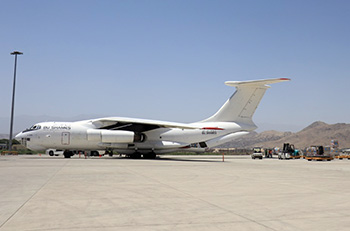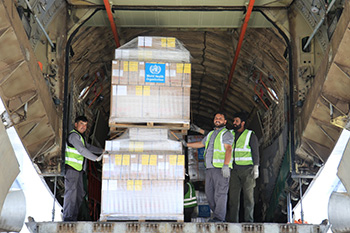 28 June 2022 – A flight containing 25 metric tonnes of WHO health supplies has just landed in Kabul from WHO’s logistics hub in Dubai to support the Afghanistan earthquake response.
28 June 2022 – A flight containing 25 metric tonnes of WHO health supplies has just landed in Kabul from WHO’s logistics hub in Dubai to support the Afghanistan earthquake response.
The shipment includes enough essential medicines, trauma and surgical supplies, and other critical health supplies for almost 400 000 people in need of health care services, including 1500 trauma patients and 2750 suspected cases of acute watery diarrhoea.
“WHO is grateful for the continued support of His Highness Sheikh Mohammed bin Rashid Al Maktoum, the Vice President and Prime Minister of the United Arab Emirates, and Ruler of Dubai, for facilitating these emergency aid flights to transport much-needed aid to Kabul. This strong show of solidarity puts into action our regional vision of Health for All, by All,” said Dr Ahmed Al-Mandhari, WHO Regional Director for the Eastern Mediterranean.
 WHO’s supplies arrive at a time when health needs have increased as a result of a devastating earthquake that struck on 22 June, killing more than 1000 people and injuring almost 3000 more. Health facilities that remain operational in the area are reporting shortages of surgical medicines and supplies to treat the injured.
WHO’s supplies arrive at a time when health needs have increased as a result of a devastating earthquake that struck on 22 June, killing more than 1000 people and injuring almost 3000 more. Health facilities that remain operational in the area are reporting shortages of surgical medicines and supplies to treat the injured.
Six hospitals supported by WHO are currently operating at full capacity for those affected in the South East region comprising Paktika, Khost, Paktya and Ghazni provinces. They are providing trauma care, physical rehabilitation and disability support. These hospitals, including Giyan Comprehensive Health Center, received a total of 1206 trauma cases between 22 and 26 June.
Immediately following the earthquake, supplies were delivered from WHO’s warehouse in Kabul to health facilities in the affected provinces, including enough trauma supplies for 5400 surgeries and medical treatments for 36 000 patients for three months.
WHO continues to work with health partners in affected areas to identify trauma needs and provide emergency health support. This includes strengthening surveillance for infectious diseases, conducting assessments in health facilities, deploying health experts, and delivering health emergency and surgical kits, medical supplies, and equipment.


